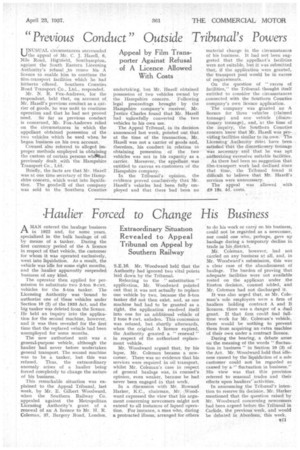.Haulier. Forced to Change His Business
Page 45

If you've noticed an error in this article please click here to report it so we can fix it.
Extraordinary Situation Revealed to Appeal Tribunal on Appeal by Southern Railway
AMAN entered the haulage business in 1922 and, for some years, specialized in the bulk haulage of oil by means of a tanker. During the first curretriy period of the A licence in respect of that vehicle, the customer for whom it was operated exclusively, went into liquidation. As a result, the vehicle was idle for some eight months, and the haulier apparently suspended business of any kind.
The operator then applied for permission to substitute two 2-ton 9-cwt. vehicles for the 5-ton tanker. The Licensing Authority was -bound to authorize one of these vehicles under Section 10 (2) of the 1933 Act, and the big tanker wa,s deleted from the licence. He held an inquiry into the application for the second machine, however, and it was then revealed for the first time that the replaced vehicle had been unemployed for some months,
The new authorized unit was a general-purpose vehicle, although the haulier had never before undertaken general transport. The second machine was to be a tanker, but this was refused. Thus, the extraordinary anomaly arises of a haulier being forced completely to change the nature of his business.
This remarkable situation was explained to the Appeal Tribunal, last week, by Mr. E. Gilbert Woodward, when the Southern Railway Co. appealed against the Metropolitan Licensing Authority's grant of a renewal of an A licence to Mr. H. R. Coleman, Si, Bargery Road, London,
&El& Mr. Woodward held that the Authority had ignored two vital points laid down by the Tribunal.
Referring to the " substitution " application, Mr. Woodward pointed out that it was not actually to replace one vehicle by two, because the 5-ton tanker did not then exist, and, as one machine had had to be granted as a right, the application resolved itself into one for an additional vehicle of 2 tons 9 cwt. unladen. This concession was refused, but shortly afterwards, when the original A licence expired, the Authority granted a " renewal " in respect of the authorized replacement vehicle.
Mr. Woodward argued that, by his lapse, Mr. Coleman became a newcomer. There was no evidence that his services were required in oil transport, whilst Mr. Coleman's case in respect of general haulage was, in counsel's opinion, even weaker, because he had never been engaged in that work.
In a discussion with Mr. Rowand Harker, K.C., chairman, Mr. ,Woadward expressed the view that his argument concerning newcomers might not extend to all instances of lapsed operation. For instance, a man who, during a protracted illness, arranged for others
to do his work or carry on his business, could not be regarded as a newcomer, nor could one who, perhaps, gave up haulage during a temporary decline in trade in his district, Mr. Coleman, however, had not carried on any business at all, and, in Mr. Vi/oodward's submission, this was a clear case of the abandonment of haulage. The burden of proving that adequate facilities were not available rested on the applicant under the Enston decision, counsel added, and Mr. Coleman had not discharged it.
It was also urged that, as Mr. Coleman's sole employers were a firm of hauliers holding contract A and B licences, there was a danger of a dual grant. If that firm could find fulltime work for Mr. Coleman's vehicle, there would be nothing to prevent them from acquiring an extra machine of their own under a contract licence.
During the hearing, a debate arose on the meaning of the words "fluctuation in business " in Section 10 (3) of the Act. Mr. Woodward held that idleness caused by the liquidation of a sole customer could not be regarded as caused by a fluctuation in business." His view was that this provision referred to seasonal trades and their effects upon hauliers' 'activities.
In announcing the Tribunal's intention to reserve its decision, Mr, Harker mentioned that the question raised by Mr. Woodward concerning newcomers had been argued before the Tribunal in Carlisle, the previous week, and would be debated in Aberdeen, this week.




























































































